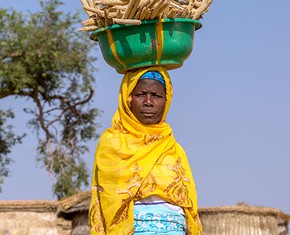The views expressed in our content reflect individual perspectives and do not represent the authoritative views of the Baha'i Faith.
We only have to look around us to see how complexity and psychic temperature are still rising: and rising no longer on the scale of the individual but now on that of the planet. This indication is so familiar to us that we cannot but recognize the objective, experiential reality of a transformation of the planet as a whole. – Pierre Teilhard de Chardin
Most people would agree with the Baha’i teachings when they say the world has entered a time of masssive change:
From every standpoint the world of humanity is undergoing a re-formation. The laws of former governments and civilizations are in process of revision, scientific ideas and theories are developing and advancing to meet a new range of phenomena, invention and discovery are penetrating hitherto unknown fields revealing new wonders and hidden secrets of the material universe; industries have vastly wider scope and production; everywhere the world of mankind is in the throes of evolutionary activity indicating the passing of the old conditions and advent of the new age of re-formation. – Abdu’l-Baha, Foundations of World Unity, p. 9.
No matter what arena of life you look at—scientific progress, technological innovation, advances in medicine, great leaps in agriculture, global understanding and cooperation, diplomacy, the extension of education and knowledge, or our evolution on hundreds of other important fronts—that “new age of re-formation” Abdu’l-Baha described has truly made the planet into something completely unprecedented.
Overwhelming evidence attests to the facts of this fundamental re-formation—so let’s use it as a given, and as the basis for a discussion of where those big changes may take us. We know major change is occurring—but in which direction? For whose benefit? For better or worse?
Everyone seems to have an opinion on the condition and direction of the world, whether good or bad, but many of those opinions seem relatively uninformed—or largely informed by the news media, which can tend to focus on the negative. As a result, actual statistics aren’t often readily available. While the presidents of several countries give State of the Union addresses, no global leader gives an annual state-of-the-world speech every year. We don’t yet have a consistent set of measures to judge our global progress by, either.
 So when we review the major global challenges—war, violence, hunger, poverty, disease, the inequality of women, illiteracy and early death—what do the actual scientific statistics reveal? What do the trend lines indicate? Here’s one excellent set of indicators: the United Nations’ Millennium Development Goals, which the world’s nations agreed to in the year 2000, and which just concluded at the end of 2015. They can actually tell us a great deal about our overall global progress, or lack of it.
So when we review the major global challenges—war, violence, hunger, poverty, disease, the inequality of women, illiteracy and early death—what do the actual scientific statistics reveal? What do the trend lines indicate? Here’s one excellent set of indicators: the United Nations’ Millennium Development Goals, which the world’s nations agreed to in the year 2000, and which just concluded at the end of 2015. They can actually tell us a great deal about our overall global progress, or lack of it.
We’ll explore those highly important issues and how they measure the state of the world in this special ten-part series of BahaiTeachings.org essays; see if we can look objectively at scientific and statistical measures for some hard facts; and then try to determine how we should spiritually and intellectually react as individuals to the conclusions. Do we have reason for despair about the direction our world is going? Or, on the other hand, do we have sufficient evidence to justify some hope? On balance, do the facts tell us that humanity is headed in a generally positive direction—or does its trajectory give us cause for cynicism, despair and doubt, if not outright alarm?
But first, why should we care? What difference does the relative condition of the world make to me, as long as my life and the lives of those I care about turn out alright?
Everybody faces these questions. We all live in the world, participate in our societies and make up our own individual cells in the body of humanity. We swim in the sea of the civilizations we create. Accordingly, each of us has either an optimistic or pessimistic outlook about the state of the world, formed by a million different inputs. We experience our own individual lives, and naturally, much of our perspective revolves around that reality. But we also experience the lives of others, in our families, our communities and in the world. Their lives have an impact on our lives. We read, listen to and watch the news. We take part in creating and imbibing the art and the literature of our cultures. While we swim in the ocean, we drink from it, too.
That means we all have a stake in where the world is headed, and we all have reason to regard the problems of the world, and their solutions, as our own. Most people with a developed conscience feel this way, at least to some degree. Every spiritual path encourages us to look beyond our own personal issue horizon, and consider the plight of others as our immediate concern, too. The Baha’i teachings urges everyone to extend our concerns past ourselves and our immediate surroundings to the entire age we live in:
Every age hath its own problem, and every soul its particular aspiration… Be anxiously concerned with the needs of the age ye live in, and center your deliberations on its exigencies and requirements. – Baha’u’llah, Gleanings from the Writings of Baha’u’llah, p. 213.
So let’s center our deliberations, for this series of essays, at least, on the exigencies and requirements of our turbulent age. Let’s see if we can discern, using rational and scientific measures rather than subjective and emotional ones, whether the world is making progress or not.
Next: Extreme Poverty and Hunger—on the Decline
















Comments
Sign in or create an account
Continue with Googleor